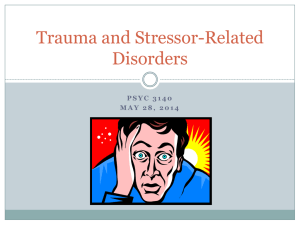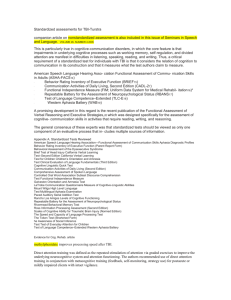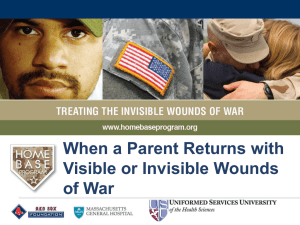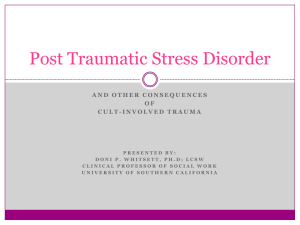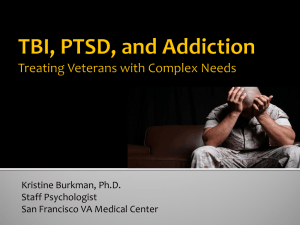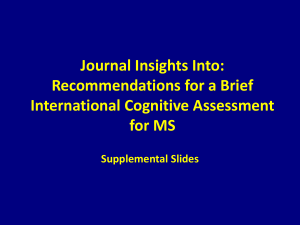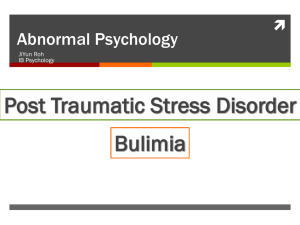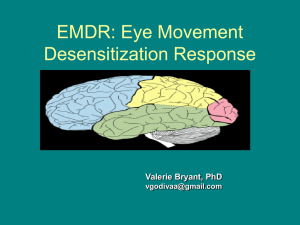The Neurocognitive Effects of TBI and PTSD: The Similarities and
advertisement
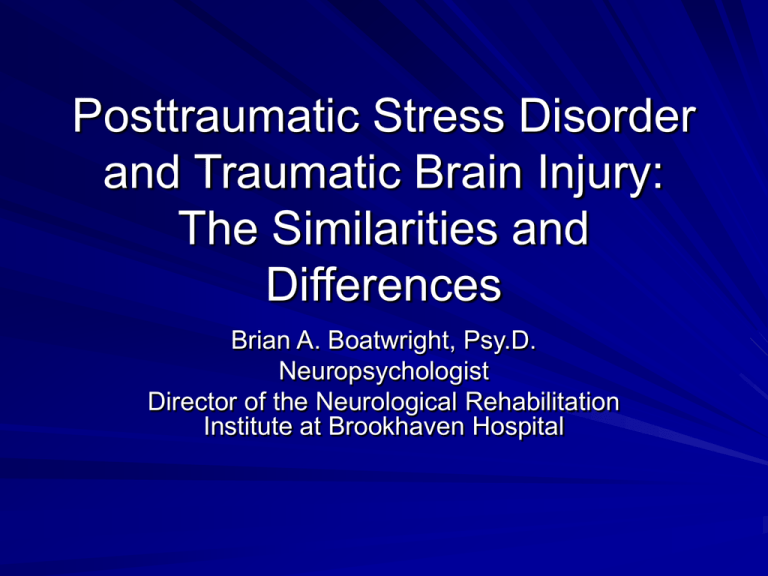
Posttraumatic Stress Disorder and Traumatic Brain Injury: The Similarities and Differences Brian A. Boatwright, Psy.D. Neuropsychologist Director of the Neurological Rehabilitation Institute at Brookhaven Hospital Objectives Compare PTSD and TBI noting the similarities and differences Review basic neuroanatomy associated with PTSD and TBI Learn important interview questions and considerations when working with TBI/PTSD population Discuss options for patients’ continuity of care Objectives Increase awareness of formal assessment Clinical case examples The Similarities PTSD Cognitive Complaints – – – – Attention Working memory Memory Slower mental processing speed TBI Cognitive Complaints (Varies according to injury) – – – – Attention Working memory Memory Slower mental processing speed The Similarities PTSD Affective/Personality – – – – Traumatic event Sleep disturbance Hypervigilance Alteration in mood (irritability, affective flattening, depressed mood) – Paranoia – Anxiety – Substance Abuse TBI Affective/Personality – – – – Traumatic event Sleep disturbance Hypervigilance Alteration in mood (irritabilty, affective flattening, depressed mood) – Paranoia – Anxiety – Substance Abuse Neuroanatomy Review Neuropsychological Domains Acquired Knowledge Attention & Memory Language Visual Spatial Motor & Sensory Perceptual Reasoning & Problem Solving Executive Functions – Planning – Processing Speed – Cognitive Flexibility Personality Social Cognition Motivation / Response Bias TBI and Neuropsychology Performance IQ loss is generally greater than Verbal IQ loss. Deficits may be seen in any number of domains, dependent on lesion location. Memory is the most prominently effected neuropsychological function but will also see marked impairment in executive functioning. Greatest improvement seen shortly postinjury but may be two years and beyond. Basic Neuroanatomy and Functional Localization Frontal Lobes – Attention – Planning – Sequencing – Organization – Mental Flexibility – Problem Solving – Impulse Control – Aspects of Memory (Executive Memory) Temporal Lobes (Hippocampus, Amygdala, Basal Ganglia) – Sound recognition and processing – Comprehension and production of speech – Aspects of memory Parietal Lobes – Integration of sensory information from the body – Contains primary sensory cortex – Proprioception – Spatial Functioning – Visuoconstruction – Aspects of memory Occipital Lobe – Primary Visual Cortex Cerebellum – Balance – Movement – Coordination – Some aspects of attention/executive functioning, frontal connections PTSD and Cognition Attention and Memory common complaints Some confounding variables-Most research in PTSD involves veterans with comorbid psychiatric diagnoses Alcohol abuse-Right hemisphere more vulnerable? Samuelson, et al. (2009) – lower scores on working memory and verbal memory (Contextually based) Samuelson, K.W., Metzler, T.J., Rothlind, J., Choucroun, G., Neylan, T.C., Lenoci, M., Henn-Haase, L., Weiner, M.W., & Marmar, C.R. (2006). Neuropsychological functioning in posttraumatic stress disorder and alcohol abuse. Neuropsychology, 20, 716-726. Studies show decreased hippocampal volume in those with chronic PTSD Verbal memory-increased intrusion errors Mental flexibility Perseverative errors Visuospatial deficits (Alcohol abuse-right hemisphere) Chicken or the Egg??? Differences in cognitive functioning prior to trauma Lower cognitive capacity risk factor for PTSD? Premorbid dysexecutive functioning Less able to shift thoughts Become stuck in behavior patterns Gilbertson, M.W., Gurvits, T.V., Lasko, N.B., Paulus, L.A., Williston, S.K., Pitman, R.K., & Orr, S.P. (2006). Neurocognitive function in monozygotic twins discordant for combat exposure: Relationship to posttraumatic stress disorder. Journal of Abnormal Psychology, 115, 484-495. Additional Neural Considerations Studies using provocation techniques elicit increased amygdala and lower frontal cortical activation Hypothesis-Verbal contextual abilities help one integrate the traumatic memory in one’s past Dorefl, D., Werner, A., Schaefer, M., & Karl, A. (2010). Pilot neuroimaging study in civilian trauma survivors episodic recognition memory, hippocampal volume, and posttraumatic stress disorder symptom severity. Journal of Psychology, 218, 128-134. The Clinical Interview-Areas of Focus Background information (education, psychiatric, medical, family history, etc.) Inform patient that the interview will be detailed and may be difficult at times Obtain specific information about the event When? Where? (Nearby, something you heard) What happened? (Blown off feet, ran over IED, learned that peer was killed) Be specific with timeline Were you knocked out? What’s the last thing you remember before the accident? What’s the first thing you remember once you regained awareness of your surroundings? Ex Post Facto What problems have you had since the event? Memory – What are you having trouble remembering? (Names, routes, written information, oral information, object locations) – When does it happen? – How often do you forget this information? – Is it more difficult at certain times? (When stressed, just after panic attack, when around certain objects, places, etc.) If you stop and think about it, does the answer or information usually come to you? Substance use? Complaints about attention/concentration – What situations are most problematic? – Do you notice any specific topics that cause you difficulty focusing? – Substance use? Other problems or concerns – Language changes – Personality changes – Relationships (Importance of collateral informant) What do I do???!!! If not clear PTSD only or suspect combination of PTSD/TBI-Refer for neuropsychological evaluation Look at timeline of TBI-Function at time of injury and post-injury Problems with return to work? Complaints from coworkers/supervisors? Secondary Gains Neuropsychological Evaluation Full review of records (MRI, CT, additional documentation) Neurobehavioral Status Examination Collateral Interview Objective Testing Effort Premorbid Estimate of Ability Current Ability (IQ) Academic Motor Functioning Memory Executive Functioning Language Personality/Psychopathology Outcome of Evaluation Final report back to provider Refer for psychotherapy/counseling If TBI, repeat neurocognitive evaluation Timeline of improvement of functioning post-TBI Early treatment for PTSD (research shows hippocampal volume decrease in chronic patients) Cognitive rehabilitation Case Example The patient is a 28-year-old, Caucasian, married, male who returned from Afghanistan three months ago. He has two children who are ages 4 and 5. The patient was referred to you by his primary care physician who suspects posttraumatic stress disorder and wants your professional opinion. While in Afghanistan, he was nearby a mortar explosion that knocked him against a wall. “I am not like I was before going off to war.” “My family tells me that I’m difficult to be around.” “I am having trouble at work. I can’t do my job like I used to.” “My friends don’t come around.” “My friends, that are still coming around, tell me I’m different.” “I can’t go places where there’s a bunch of people.” “I’m having trouble driving.” “Reading is more difficult.” “I just can’t watch t.v.” The patient’s wife reports, “My husband stays away from the rest of the family. It’s like having a stranger in the house.” The patient’s wife reports, “He doesn’t help with cooking and keeping up with things around the house anymore.” The patient’s wife reports, “My husband forgot to pick up the kids from school.” The patient’s wife reports, “His boss called me and said he’s different at work.”
